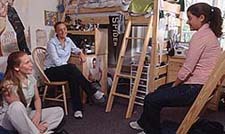 Students may give up the comfort of home when they go to boarding school, however, as they become more independent, they discover a new comfort level and obtain direction for their future. Boarding schools offer ideal settings for students to learn responsibility. Typically, they are located in scenic environments, have incredibly supportive faculty and create warm atmospheres, which foster lasting friendships. Many teachers live directly on campus, serving as house parents for the students in their dorms. They integrate fully into a student’s life so that students can experience the nurturing feeling of home.
Students may give up the comfort of home when they go to boarding school, however, as they become more independent, they discover a new comfort level and obtain direction for their future. Boarding schools offer ideal settings for students to learn responsibility. Typically, they are located in scenic environments, have incredibly supportive faculty and create warm atmospheres, which foster lasting friendships. Many teachers live directly on campus, serving as house parents for the students in their dorms. They integrate fully into a student’s life so that students can experience the nurturing feeling of home.
 For some students this is their first involvement in sports, art, music or drama. Others explore more experiential activities, such as the outdoors. They can experience what it’s like to be part of a team, perform in front of others, develop leadership skills or give back to their communities.
For some students this is their first involvement in sports, art, music or drama. Others explore more experiential activities, such as the outdoors. They can experience what it’s like to be part of a team, perform in front of others, develop leadership skills or give back to their communities.
 The structure that boarding schools offer, with mandatory study time, helps students organize their time more effectively, allowing them to obtain skills they may not have had previously. Those, in particular, with learning disabilities, can benefit from the extra resources, such as a learning center, right on campus.
The structure that boarding schools offer, with mandatory study time, helps students organize their time more effectively, allowing them to obtain skills they may not have had previously. Those, in particular, with learning disabilities, can benefit from the extra resources, such as a learning center, right on campus.
Consistent, overwhelming level of attention, coupled with an intimate learning environment, makes for a good combination of factors, leading to confident, happy, well-prepared adolescents.
Boarding schools for Students with Learning Disabilities, ADD, ADHD
Too frequently, bright and intellectually capable students are academically unsuccessful because they are frustrated by a learning disability. Despite progress made in understanding learning disabilities, there is a lot that remains a mystery. However, an intelligent, motivated student who is diagnosed as learning disabled, can, with proper guidance and learning assistance, succeed academically in spite of his or her disability.
Students with diagnosed learning disabilities may display poor time management skills, organizational difficulties, visual-spatial weaknesses, dyslexia, dysgraphia, dyscalculia, and difficulty with abstract conceptual reasoning and/or social situations.
Students with non-verbal learning disabilities often have difficulty with social cues, peer interactions and may have emotional overlays of depression, Obsessive-Compulsive Disorder (OCD),and Attention Deficit Hyperactivity Disorder (ADHD). Performance in school may decline with low frustration tolerance in both academic and social areas. The academic program, combined with tutorial instruction, enables students to understand their unique learning styles and develop the tools to address weaknesses while enhancing strengths.
Those who are in need of specialized services because of learning differences or neurological disorders, ie. (Aspergers’s, Autism spectrum disorders, Tourette Syndrome, Traumatic brain injury), or who may have emotional, behavioral, or psychological problems, are referred for placement to appropriate schools and programs.
The services provided by our company are unique because of the knowledge of specialized facilities, the understanding of clinical issues, a personal approach to selecting resources and the ability to help families get the best results for their investment.
Costs average $50,000-$60,000 per year.





